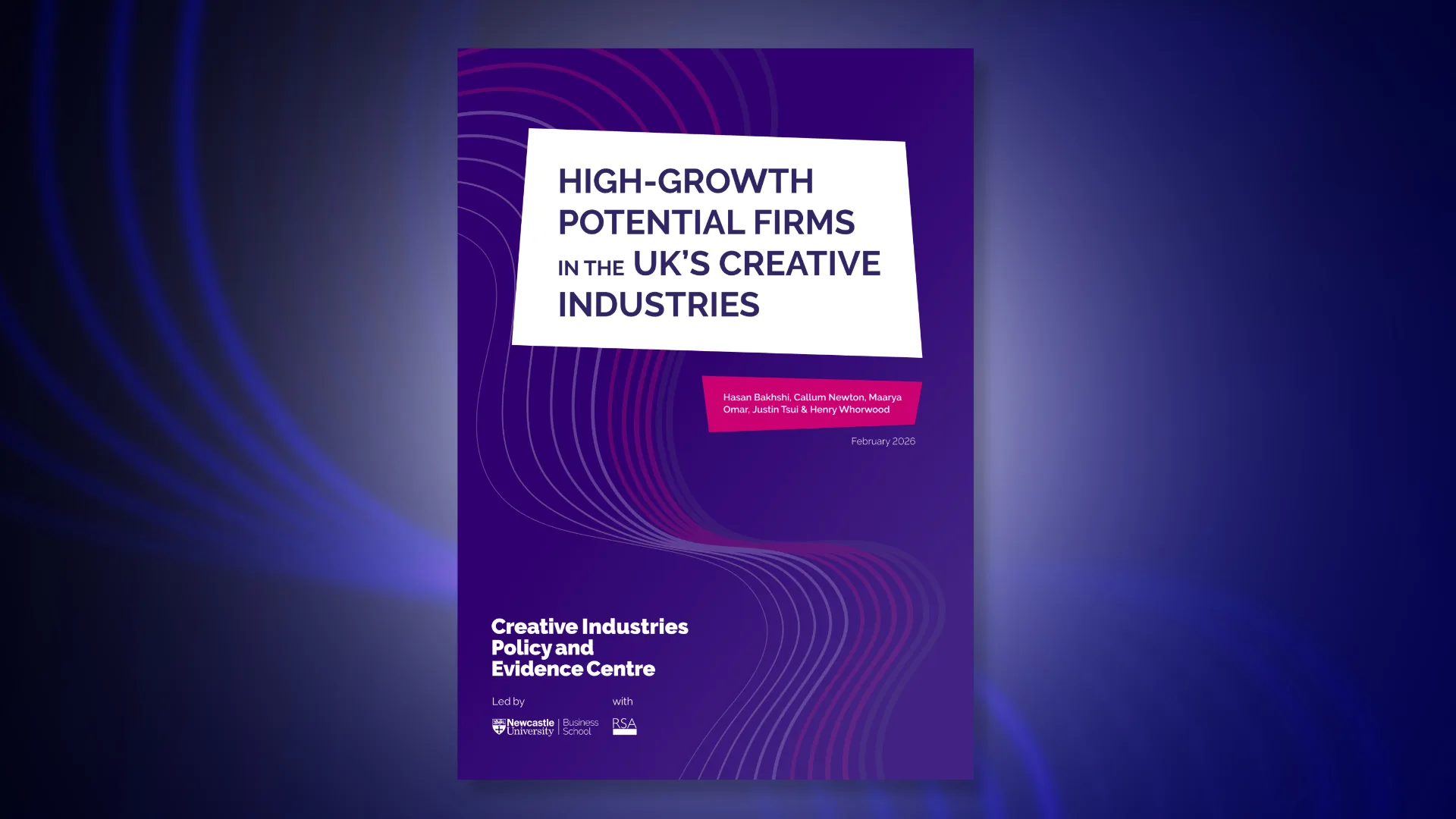Research into freelancers, place-based growth and business models in the creative industries
Alongside the PEC’s ongoing research programme, we also commission studies from research organisations which are outside of our own network. This enables us to address critical gaps in evidence about the sector, and to support the wider creative industries research community beyond our consortium of 10 universities and industry partners.
We recently announced our first open call for proposals for commissioned research projects. We were looking for projects to produce independent evidence that could aid the development of policies to support the creative industries in the UK. We shared the following four areas of research need which we encouraged applicants to consider:
- Following the publication of The Augar Review of Post-18 Education, the value of creative post-18 education and the measurement of this value
- How cultural institutions and the cultural sector contribute to the creative industries in their local areas, including to the growth of local creative industries
- How freelancers and micro enterprises contribute to the UK’s creative industries, and of the particular challenges that they face
- Business models and business model innovation in the creative industries, relating for example to the creation and capturing of value within value networks
We also asked that proposals complement the PEC’s existing research portfolio, which comprises five main areas of work of Creative Clusters and Innovation; Skills, Talent and Diversity, Intellectual Property; Business Models, Access to Finance and Content Regulation; Arts, Culture and Public Service Broadcasting; and International Competitiveness.
We are delighted to announce the six successful proposals from our first open call for research projects and look forward to working with the teams over the coming months.
Creative freelancer business models and place-based growth
Led by Coventry University in collaboration with Creative United, Waltham Forest Borough Council, Coventry City of Culture Trust, Warwick Institute of Employment Research and Northumberland County Council.
Lead investigators: Professor Nick Henry and Dr Paul Sissons
The project will address an important evidence gap around the contribution of freelancers to the economic and place-based impacts of the creative industries. It will generate new insights into the business models of creative freelancers and their relationship to local labour markets, creative networks, supply chains and innovation ecosystems – as well as identifying the challenges that they face.
Designed to produce ‘deep dive’ qualitative evidence on creative freelancers, this research will increase understanding of the economic relationships, dynamics and business personas of freelancer models in order to directly support locally-based investment and policy responses to creative industry business models.
Creative industries and the Preston Model
University of Central Lancashire (UCLAN)
Lead investigators: Professor Philip Whyman and Dr Adrian Wright in collaboration with Dr Julian Manley, Dr Richard Weston, Dr Alina Petrescu and Dr Philip Kostov.
This project will examine to what extent the Preston Model facilitates the growth and development of the creative industries, within Lancashire. It will focus mainly on the effect of procurement by anchor institutions and the findings will provide an evidence base to local policy makers of potential drivers for successful creative clusters, and the degree to which generic initiatives such as the Preston Model, need to be tailored to enhance support given to specific sectors.
Film Bang 1976-2020 – resilience and sustainability for freelance careers in the screen industries
Edinburgh Napier University in collaboration with Marianne Mellin from Film Bang
Lead investigator: Alistair Scott
This project seeks to identify ways to support progression, resilience and sustainability for freelance careers in the screen industries. The study draws on over four decades of data contained in the Film Bang directory relating to the numbers and composition of production personnel and technicians working in Scotland. The information in the listings will be coded to capture the changing profile of this community of practice and track continuity of employment. This will provide information about career pathways that can inform future policies to support freelance talent development.
The impact of cultural institutions on local creative industries: Culture Mile and five UK benchmarks
Led by AEA Consulting in collaboration with Culture Mile, Geoffrey Crossick and Global Cultural Districts Network.
Lead investigator: Natalia Vartapetova
This project seeks to deepen national understanding of urban clusters in which not-for-profit cultural organisations and creative industries coexist. The study will also examine whether there are ways in which such co-location may act as a framework for mutual growth. Culture Mile in the City of London is the core case study district for an in depth inter organisational networks analysis and the team will also conduct comparative analyses of five other cultural districts across the UK: Better Bankside (London), Salford Quays, Newcastle/Gateshead Quays, Bristol Harbourside and Dundee Waterfront.
The UK live music industry in a post-2019 era: a globalised local perspective
Led by Aston University in collaboration with Dr Adam Behr from Newcastle University and Craig Hamilton from Birmingham City University.
Lead investigator: Dr Patrycja Rozbicka
This project aims to increase understanding of key socio-political factors with the potential to influence the prosperity and sustainability of the creative industries. The focus for the research will be the live music sector in Birmingham and the study will map the ecologies in order to uncover the interdependencies across different local and global stakeholders. The team will also explore both the potential vulnerabilities to global/political shifts for the sector and the ways in which actors within the value chains anticipate and respond to these challenges by developing mitigation or adaptation strategies.
Working together: co-ops as a creative industry business model
University of Glasgow in collaboration with Cultural Workers Organize
Lead investigator: Professor Kate Oakley
This project will examine co-operatives as an alternative business model to solely commercial firms. The study will also look at how effective public policy has been in promoting co-operatives as a way of working in the creative industries and the variations in adoption across sub-sectors. To do this, the focus will be on Scotland, where the devolved government has an explicit policy to promote co-operative ways of working. The research will also consider whether co-operatives offer a vehicle to counter issues of diversity and examine how well the model is understood amongst creative workers. Additionally the study will explore what skills and training people think they may need to set up co-operatives, and how public policy, higher education and business support can respond to that.
These six proposals requested £236,086 in total, ranging from a little under £28,000 to a little under £50,000. We look forward to working with the successful applicants and would like to thank all of the applicants for their submissions and interest in the creative industries, as well as providing policy and evidence to support these industries.
Find out more about our research commissioning process.
Photo by 🇸🇮 Janko Ferlič
Related News and Press
Creative Industries present huge investment opportunity
New research shows ‘high-growth potential firms’ outnumber both Life Sciences and Advanced Manufactu…
Bolster business and financial support for creative industries micro firms to achieve UK innovation and growth ambitions
New Creative PEC research suggests creative industries micro firms have a vital role to play in driv…
Back the creative industries to grow the economy, says new research showing creative firms are more likely to be innovators and exporters
New research finds a higher share of UK creative MSMEs are exporters compared with the rest of the e…



